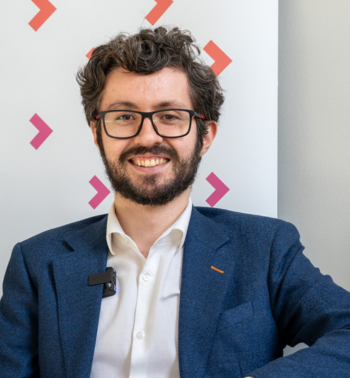8 April 2025
Dr Hamilton Morrin is a general adult psychiatry registrar at South London and the Maudsley NHS Foundation Trust. On Thursday 15 May he will be joining a panel at the Maudsley Neurotechnology Conference. KHP News spoke with Dr Morrin to find out more about his work in the partnership and to get a preview of what attendees can expect at the upcoming event.
What is your role?
Alongside my clinical role, I am also a doctoral fellow on the King’s College London Mental Health PhD Fellowship scheme. With this fellowship I chose to explore the use of VR and brain-computer interface (BCI) based approaches in functional neurological disorder.
What is functional neurological disorder?
Functional neurological disorder (FND) is a condition where there is a breakdown in how the brain sends and receives signals from the body, without there necessarily being any structural damage to the nervous system. It is incredibly common, being the second most likely reason for someone to visit a neurologist (after headache). The condition manifests in a variety of ways, including motor weakness, tremors, seizures, sensory disturbances, and pain.
What is the BRAVE-FND study?
Together with colleagues at Maudsley Neurotechnology and the King’s College London Neuropsychiatry Research and Education Group, I am running the BRAVE-FND (Brain-computer interface Rehabilitation and Virtual Environments in FND) study. This study seeks to explore the feasibility of BCI and VR approaches in FND, their potential impact on suspected underlying mechanisms — including sense of agency. Down the line, this study will explore their effect on outcomes including symptom severity, daily function, and mental health outcome measures.
Why is this study needed and how could it benefit patients?
Despite being incredibly common, currently available interventions for FND are limited. Not all regions in the UK have access to dedicated FND services, and those that do have access often are limited by long waiting lists for treatment, which can often include psychoeducation, physiotherapy, and psychotherapy. Therefore, there is a real need to develop novel treatments for this population, particularly those who may not respond to first-line therapies.
Brain-computer interfaces (BCIs) are devices that provide a form of neurofeedback, allowing individuals to control output on a computer using their brain signals (typically an electroencephalogram EEG). Non-invasive BCIs have been used in neurological settings for rehabilitation for individuals who have had a stroke or spinal cord injury. However, to date nobody has explored their potential use for people living with FND. I intend to do so through the BRAVE-FND trial.
How do you work as part of King’s Health Partners?
Over the next three years as a Doctoral Fellow and psychiatrist with King’s Health Partners I will be spending most of my time setting up, recruiting for, and delivering the BRAVE-FND trial. I will be working in tandem with a panel of individuals with lived experience who will help to shape the direction that the study takes, providing vital feedback on its progress. In addition, as part of Maudsley Neurotechnology, I will be involved in a number of other exciting studies. Some of our upcoming studies will explore novel forms of non-invasive deep brain stimulation, such as focused ultrasound or temporal interference. One day these may be used to help people living with a wide range of neuropsychiatric disorders.
Can you give us a preview of the Maudsley Neurotechnology Conference?
As a speaker at the conference, I will be sharing the findings from our case report of one patient with FND who underwent a course of sessions of motor imagery rehearsal rehabilitation using the g.tec recoveriX closed-loop BCI. Feedback from our patient participant has been incredibly helpful for shaping the design of the study and serves as a strong starting point for the BRAVE-FND study. Of course, none of this would be possible without the support of my incredible supervisors - Dr Paul Shotbolt, Dr Tim Nicholson, and Prof Mark Edwards - as well as other excellent collaborators within and beyond the KHP network.
To learn from Dr Hamilton Morrin and other expert guest speakers sign up to join the informative event, taking place on Thursday 15 May, 8:30am - 6:30pm. Attendees will hear about some of the latest about advancements in neurotechnology and there will also be an opportunity to network with professionals working across the sector. Register for the Maudsley Neurotechnology Conference here.





